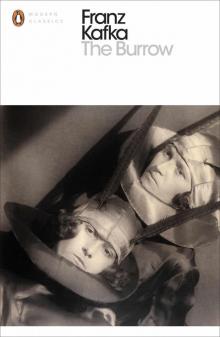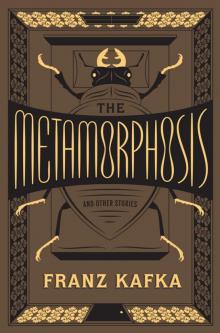- Home
- Franz Kafka
The Metamorphosis and Other Stories Page 2
The Metamorphosis and Other Stories Read online
Page 2
He thought about how this friend, dissatisfied with his progress at home, had actually sought refuge in Russia many years ago. Now he ran a business in St. Petersburg, which had gotten off to a very good start, but seemed to have been stagnating for some time, as his friend complained during his increasingly seldom visits. So he was slaving away in his foreign country to no avail, his foreign beard poorly concealing the face that Georg had known since childhood, whose yellow complexion seemed to indicate an emerging illness. As he explained, he had no real ties to the colony of fellow countrymen there, and hardly any social interaction with local families either, and was therefore resigning himself to permanent bachelorhood.
What should you write to such a man, who had apparently taken the wrong track, whom you could pity, but whom you could not help? Should you maybe advise him to come back home, to shift his livelihood back here, to resume all his old friendly relations—for which there was certainly no hindrance—and to rely upon the support of his friends for everything else? This would mean nothing less than telling him simultaneously—the more gently, all the more insultingly—that his previous attempts had failed, that he should finally give them up, that he should return and be forced to let everyone stare with big eyes at one who has returned for good, that only his friends have a clue, and that he is an overgrown child who is to follow his successful friends who stayed home. And was it even certain that there was a reason for the burden that would be placed upon him? Perhaps you would not even succeed in bringing him home at all—he said himself, after all, that he no longer understood the state of affairs at home—and so, in spite of everything, he would stay in his foreign country, embittered by the suggestions, and all the more estranged from his friends. But were he to actually follow your advice and become—not intentionally, of course, but due to the circumstances—dejected, unable to reconcile himself with his friends or find his way without them, suffering from humiliation, truly having no home and no friends any longer, wouldn’t it be much better for him to stay abroad as he was? Would it be possible under such circumstances to think that he would really make progress here?
For these reasons, you were not able, if you still wanted to even maintain your contact by letter, to really convey any information at all, such as you would convey to even the most distant acquaintance without hesitation. This friend had not been home for more than three years now and explained quite feebly that this was due to the uncertain state of political affairs in Russia, which would allegedly not permit a small businessman even the briefest period of absence, while hundreds of thousands of Russians were traveling the world as they pleased. During the course of these three years, however, many things had changed, especially for Georg. News of the death of Georg’s mother, which had taken place about two years ago, and since which Georg and his old father had been sharing a common household, had apparently reached his friend, who expressed his condolences in a letter with a dryness that could only be the result of the fact that grief due to such an event becomes entirely unimaginable so far from home. Now since that time, however, Georg had tackled his business, as well as everything else, with greater determination. Perhaps his father had been a hindrance while his mother was still alive, only allowing his own opinion to be accepted and thus preventing his son from truly fulfilling his own function in their business; perhaps his father had become more reserved since the death of his mother, although he still worked in the business; perhaps fortunate coincidences—which was in fact very likely—played a far greater role, but in any case, their business had developed quite unexpectedly in these two years, they had had to double their staff, their revenue had increased fivefold, and further progress was doubtlessly imminent.
But his friend had no inkling of this change. Earlier, for the last time perhaps in that letter of condolence, he had wanted to persuade Georg to emigrate to Russia and had talked at length about the prospects in St. Petersburg for precisely Georg’s line of business. The figures were vanishingly small in comparison to the scope that Georg’s business had now taken on. But Georg had not felt like writing his friend about his business successes, and had he done it now, in retrospect, it would have certainly appeared strange.
So Georg confined himself to writing his friend only of meaningless events, which, when you are lost in thought on a quiet Sunday, pile up in your memory in no particular order. He wanted nothing other than for the image that his friend had no doubt made of his hometown during his long absence, and to which he had resigned himself, to remain intact. So it happened that Georg announced to his friend the engagement of one incidental person to an equally incidental girl three times in letters written at rather large intervals, until indeed, quite contrary to Georg’s intention, his friend then began to become interested in this remarkable event.
Yet Georg would much rather write to him about such things than confess that he himself had become engaged to a Fräulein Frieda Brandenfeld, a girl from a wealthy family. He often spoke to his bride about this friend and the peculiar correspondence relationship he had with him. “So he won’t come to our wedding at all then,” she said, “although I have a right to meet all your friends.” “I don’t want to disturb him,” answered Georg, “You see, he would probably come, at least I think so, but he would feel coerced and resentful, would maybe envy me and surely feel discontented; and, incapable of ever disposing of his discontentment, he would return home alone. Alone—do you know what that is?” “Yes, but couldn’t he also hear of our marriage another way?” “That is indeed something I cannot prevent, but with his lifestyle it is unlikely.” “If you have such friends, Georg, you shouldn’t have gotten engaged at all.” “Yes, we are both at fault; but I wouldn’t have it any different now.” And when she then, breathing quickly under his kisses, managed to say “It actually does upset me after all,” he found it truly innocuous to tell his friend everything. “This is how I am, and this is how he must accept me,” he told himself. “I cannot tailor myself into a person who may be more suited to his friendship than I.”
And he did indeed report his engagement to his friend in the long letter that he wrote that Sunday morning with the following words: “The best news I have saved for last. I have become engaged to a Fräulein Frieda Brandenfeld, a girl from a wealthy family, who didn’t settle here until long after your departure and who could therefore hardly be familiar to you. There will certainly be an opportunity for me to tell you more about my bride, but for today, be content to know that I am quite happy and that our mutual relationship has only changed to the extent that instead of having a very ordinary friend, you will now have in me a happy friend. Furthermore, you will acquire in my bride, who sends her warm greetings and who will be writing you herself soon, a sincere friend, which is not entirely without significance for a bachelor. I know there are many things holding you back from visiting us, but wouldn’t my wedding be just the right occasion to throw all those obstacles aside for once? In any case, act without any sense of obligation and only as you see fit.”
With this letter in his hand, Georg had sat for a long time at his desk, his face turned toward the window. As an acquaintance passed by and greeted him from the street, he had barely replied with an absent smile.
He finally put the letter in his pocket and walked from his room across a small hallway to his father’s room, which he had not been in for months. It was not usually necessary to do so, for he was constantly in contact with his father in their business, they had their lunch in a restaurant at the same time, and although each had his evening meal as he pleased, they usually then sat for a while—unless Georg met with friends, as occurred most frequently, or nowadays visited his bride—each with his own newspaper, in their common living room.
Georg was amazed at how dark his father’s room was, even on this sunny morning. So this was the shadow cast by the high wall that rose on the other side of the small courtyard. His father sat by the window in a corner decorated with various remembrances of his late mother and read the news
paper, which he held sideways before his eyes, in an attempt to compensate for some sort of visual impairment. On the table were the remains of his breakfast, of which not much seemed to have been eaten.
“Ah, Georg!” said his father and came at once to meet him. His heavy dressing gown opened as he walked, the skirts fluttering around him—“My father is still a giant,” Georg said to himself.
“It’s unbearably dark in here,” he then said.
“Yes, it is dark indeed,” answered his father.
“You’ve closed the window as well?”
“I prefer it that way.”
“Well, it’s very warm outside,” said Georg, adding to his previous remark, and sat down.
His father cleared the breakfast dishes and placed them on a chest.
“Actually, I only wanted to tell you,” continued Georg, who followed the old man’s movements quite forlornly, “that I have announced my engagement in St. Petersburg after all.” He pulled the letter out of his pocket a little and let it fall back again.
“In St. Petersburg?” asked his father.
“To my friend there,” said Georg and sought his father’s eyes.—“But at work he is completely different,” he thought, “how he sits here broadly and folds his arms across his chest.”
“Yes. To your friend,” said his father with emphasis.
“But you know, Father, that I wanted to keep my engagement from him at first. Out of consideration, for no other reason. You know yourself that he is a difficult person. I told myself, he could possibly hear of my engagement from someone else, even though this is hardly likely given his solitary lifestyle—I can’t prevent that—but he should not hear about it from me.”
“And now you have had second thoughts?” asked his father, laying the large newspaper on the windowsill, and on the news-paper his glasses, which he covered with his hand.
“Yes, now I have had second thoughts. If he is my good friend, I told myself, then my happy engagement will also bring him happiness. And this is why I no longer hesitated in announcing it to him. But before I drop off the letter, I wanted to tell you.”
“Georg,” said his father, drawing his toothless mouth wide, “listen to me! You have come to me with this matter in order to consult with me. That honors you, no doubt. But it is nothing, worse than nothing, if you now fail to tell me the entire truth. I do not wish to stir up things that do not belong here. Since the death of our dear mother, certain unpleasant things have taken place. Perhaps the time will also come for them and perhaps it will come sooner than we think. Many things escape me at work, perhaps it is not being hidden from me—now I do not wish to assume that it is being hidden from me—I am no longer strong enough, my memory is deteriorating, I no longer have an eye for all the many things. First, that is the course of nature and second, the death of our dear little mother struck me far more than you.—But because we are talking about this issue in particular, about this letter, I beg you, Georg, do not deceive me. Do you really have this friend in St. Petersburg?”
Georg stood up, unsettled. “Let’s forget my friend. A thousand friends cannot replace my father. Do you know what I think? You’re not taking good enough care of yourself. But old age demands its dues. You are indispensable to me at work, this you know very well, but if work is threatening your health, I will close our business for good first thing tomorrow. That won’t do. We will have to change your lifestyle. And fundamentally. You are sitting here in the dark and you would have such nice light in the living room. You nibble at your breakfast instead of strengthening yourself properly. You sit with closed windows and fresh air would do you so much good. No, my father! I’ll fetch the doctor and we will follow his instructions. We will exchange rooms, you will move into the front room, I’ll move in here. It will be no change for you, everything will be carried over with you. But there’s time for all that later. Now lie down in bed for a while, you definitely need to rest. Come, I’ll help you to get undressed, you’ll see, I can do it. Or if you would like to move to the front room right away, you can lie down in my bed for the time being. That would be very sensible, by the way.”
Georg stood right beside his father, who had let his head with its disheveled white hair sink to his chest.
“Georg,” his father said quietly, without moving.
Georg knelt down immediately next to his father, he saw the pupils enlarged in the corner of his father’s tired eyes directed at him.
“You have no friend in St. Petersburg. You’ve always been a clown and haven’t even restrained yourself with me. How could you have a friend there, of all places! I can’t believe that at all.”
“Think back once again, Father,” Georg said. He lifted his father from the armchair, and took off his dressing gown as he stood there rather feebly. “Now it was almost three years ago that my friend came to visit us. I still remember that you didn’t like him particularly well. At least twice, I denied to you that he was my friend, even though he was sitting in my room. I could understand your aversion very well; after all, my friend has his peculiarities. But then again, you also conversed with him very well. I was so proud back then that you had listened to him, nodded, and asked questions. If you think about it, you must remember him. He told unbelievable stories about the Russian Revolution. For example, how on a business trip in Kiev he saw a priest on a balcony during a riot who cut a broad cross in blood into the palm of his hand, raised this hand and called to the crowd. You’ve told this story yourself every now and then.”
Meanwhile, Georg had managed to sit his father back down and carefully take off the knitted pants that he wore over his linen underpants, as well as his socks. He reproached himself for having neglected his father at the sight of his not particularly clean underclothes. It had surely also been his duty to keep watch over his father’s change of underclothes. He had not yet spoken explicitly with his bride about how they wanted to arrange his father’s future, for they had quietly assumed that his father would remain in their old home alone. But now he decided quickly and with complete certainty to bring his father along into his future household. It almost seemed, on closer inspection, that the care that his father was to be provided with there could come too late.
He carried his father to bed in his arms. He had a terrible feeling when he realized during the few steps to his bed that his father at his breast was playing with his watch chain. He couldn’t put him in bed right away, so tight was his grip on this watch chain.
But no sooner was he in bed than everything seemed fine. He covered himself up and even drew the bedcover up particularly high over his shoulders. His expression as he looked up to Georg was not unkind.
“You remember him after all, am I right?” Georg asked and nodded to him encouragingly.
“Am I covered up well now?” his father asked, as though he couldn’t look to see if his feet were properly covered.
“So you like it in bed,” Georg said and rearranged the blanket around him.
“Am I covered up well?” his father asked once again and seemed to pay particular attention to the answer.
“Just calm down, you are covered up well.”
“No!” his father shouted, so that the answer thrust against the question, threw the blanket back with such strength that it unfolded completely during its moment of flight, and stood upright in bed. With only one hand he held lightly onto the ceiling. “You wanted to cover me up, this I know, my rascal, but I am not covered up yet. And even if this is the last of my strength, it’s enough for you, too much for you. Of course I know your friend. He would have been a son after my own heart. That is why you have been deceiving him all these years. Why else? Do you think I haven’t wept for him? That is why you lock yourself in your office, not to be disturbed, the boss is busy—just so you can write your deceitful little letters to Russia. But fortunately no one has to teach this father to see through his son. And now, just as you believed that you had gotten him down, so far down that you can sit on him with your backside
without him stirring, my most distinguished son has decided to marry!”
Georg looked up to his father’s terrible image. His friend in St. Petersburg, whom his father suddenly knew so well, moved him as never before. He imagined him lost in faraway Russia. He imagined him at the door of his empty, plundered store. He was just managing to stand between the ruins of the shelves, the shredded merchandise, the falling gas fixtures. Why did he have to go so far away!
“But look at me!” shouted his father, and Georg ran, almost absentmindedly, to his bed in order to grasp everything, but balked halfway in his tracks.
“Because she lifted her skirts,” his father began to warble, “because she lifted her skirts like this, the disgusting cow,” and to demonstrate this he lifted his shirt so high that you could see the scar on his thigh from his war years, “because she lifted her skirts like this and this and this, you had a go at her, and in order to satisfy your desires with her without interruption, you have violated our mother’s memory, betrayed your friend, and put your father to bed, so he can’t stir. But he can stir, can’t he?”
And he stood entirely free and flung his legs. He radiated with insight.
Georg stood in a corner, as far as possible from his father. A long time ago he had firmly resolved to observe everything very precisely so that he could not be taken by surprise, indirectly somehow, coming from behind, down from above. Now he recalled his long-forgotten resolve and forgot it again, just as a short thread is pulled through the eye of a needle.
“But your friend has not been betrayed after all!” shouted his father, and his finger was wagged back and forth to reinforce it. “I was his representative here on site.”

 Diaries of Franz Kafka
Diaries of Franz Kafka Metamorphosis and Other Stories
Metamorphosis and Other Stories The Castle: A New Translation Based on the Restored Text
The Castle: A New Translation Based on the Restored Text The Complete Stories
The Complete Stories In the Penal Colony
In the Penal Colony The Trial
The Trial Amerika
Amerika The Burrow: Posthumously Published Short Fiction
The Burrow: Posthumously Published Short Fiction Sons
Sons Letters to Milena
Letters to Milena Investigations of a Dog: And Other Creatures
Investigations of a Dog: And Other Creatures Collected Stories
Collected Stories The Great Wall of China
The Great Wall of China The Burrow
The Burrow The Castle
The Castle The Meowmorphosis
The Meowmorphosis The Sons
The Sons The Lost Writings
The Lost Writings The Unhappiness of Being a Single Man
The Unhappiness of Being a Single Man Amerika: The Missing Person: A New Translation, Based on the Restored Text
Amerika: The Missing Person: A New Translation, Based on the Restored Text The Burrow: Posthumously Published Short Fiction (Penguin Modern Classics)
The Burrow: Posthumously Published Short Fiction (Penguin Modern Classics) The Diaries of Franz Kafka
The Diaries of Franz Kafka Investigations of a Dog
Investigations of a Dog The Metamorphosis and Other Stories
The Metamorphosis and Other Stories The Trial: A New Translation Based on the Restored Text
The Trial: A New Translation Based on the Restored Text